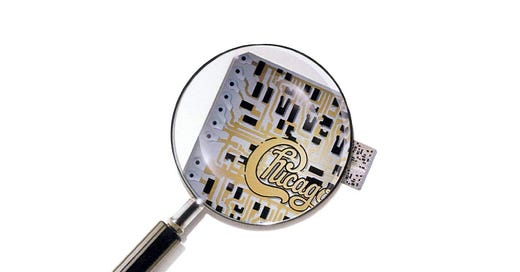Chicago released their thirteenth studio album, Chicago 16, on May 26, 1982, on Full Moon. This was their first of three albums produced by David Foster, who co-wrote seven of the album's ten songs. Peter Cetera, who co-wrote four songs, sings lead on everything apart from the Bill Champlin-sung "Follow Me," one of three James Pankow co-writes. Most of the tracks are slick uptempo numbers apart from the two radio ballads, "Hard to Say I'm Sorry" and "Love Me Tomorrow," both Cetera–Foster co-writes.
Side one has three songs by outside writers: "What You're Missing," "Waiting for You to Decide," and "Chains."
"What You're Missing" opens Chicago 16 with a shiny riff (in A) and exuberant verses that cut to a contoured chorus (in Cmaj7). MCA recording artist Joseph Williams (son of film composer John Williams) wrote the song with Jay Gruska, the keyboardist–singer in Warner melodic rockers Maxus.
The second track, "Waiting for You to Decide," is a spirited exchange between Cetera and Champlin, whose Lou Rawls-influenced vocals carry the song's bridge — his first lead on a Chicago album. Structurally, it opens with a closed-cadence keyboard riff (in B with hammered sixes), settles into Peter's verse (in E) and cuts to Bill's "I still love you, even though" bridge (in C), which opens the harmonized chorus (in B). Foster wrote the song with two members of Toto: guitarist Steve Lukather and keyboardist David Paich, who both appear as auxiliary musicians along with bandmate and fellow keyboardist Steve Porcaro, credited with synthesizer programming.
"Chains," an uptempo rocker, opens with a blasting riff and a jagged synthesized melody (3-2-4-3-2-3 over D; modulated to B♭). This cuts to a matted, close-cadence, chromatic descent, where Cetera sings of his resolve to avoid shameful acts:
I put my conscience under a stone
The stone under the ground
Walked from where I had left it
I hoped it couldn't be found
My conscience persisted
It's a haunted seed I have sown
Calls me out from the distance
And it just won't leave me alone
Canadian musician Ian Thomas wrote "Chains," which first appears on his 1981 Anthem Records release The Runner, the source of hits for Santana ("Hold On'') and Manfred Mann's Earth Band ("The Runner''). On Chicago 16, "Chains" comes after "Bad Advice," a funky R&B number with gritty Champlin verses and a slick chorus by Cetera, who wrote it with Foster and Pankow.
Side two opens with "Follow Me," which has a slick nine-chord opening riff (the chorus theme) and exuberant verses where Champlin bellows inspirational lines like:
One more time, toe the line
Nothing in life is impossible
Both of us know
Life is as good as we make it
A fan favorite, "Follow Me" climaxes with an extended brass coda that accelerates in urgency toward the fadeout. This is one of two Pankow–Foster numbers. The other, "What Can I Say," is a mid-tempo ballad with billowing trumpet and airy Cetera vocals over smooth keyboards. It's preceded by "Sonny Think Twice," a smooth soul-pop number co-written by drummer Danny Seraphine and Champlin, who delivers lines of reflection and brotherly advice to a crest-fallen subject before handing the chorus to Cetera. On the penultimate "Rescue You," Cetera presents himself as a knight in shining armor to a troubled woman in a toxic relationship.
Each side closes with a slow ballad. "Hard to Say I'm Sorry" opens with a grand piano line that yields to quiet verses, where Cetera's initial couplet summons the harmonized vocal hook "from each other." The title is sung on the bridge, not the chorus, which instead opens with "After all that we've been through," a line that also appears in the chorus to "I Do Believe in You," a song by LA smooth-rockers Pages (fronted by Foster-associate Richard Page) on their 1979 second album Future Street. On Chicago 16, "Hard to Say I'm Sorry" segues into "Getaway," a rocking postlude co-credited to Chicago’s onetime chief writer Robert Lamm, a marginalized figure during this album's sessions.
The closing track, "Love Me Tomorrow," opens with an ascending guitar riff that cuts to quiet, string-laden verses. Cetera's "she loves me" bridge summons the non-sequitur chorus: a tight guitar-based pattern not anticipated by the verse-bridge sequence. The song folds with an orchestral fadeout conducted by concertmaster Gerard Vinci.
Foster produced Chicago 16 at four South California studios: Davlen Sound Studios (Hollywood), Skyline Recording (Topanga), Record Plant and Bill Schnee Studios (both Los Angeles). Humberto Gatica engineered the album in succession with 1982 titles by David Roberts, Harvey Mason, Lee Ritenour, and Sister Sledge.
Chicago 16 sports a cover co-credited to designers John Kosh and Ron Larson. It breaks from prior Chicago covers with its minimal imagery, white backdrop, and conventional sans-serif title font. It shows a tiny computer chip under a magnifying glass, which partially reveals the logo (worked into the chip). The back cover features titles and a full-scale zoom-in on the chip with the logo, once again, only partially visible. The inner-sleeve, which resembles a traditional Chicago cover, illustrates the entire chip with the logo formed by its center conductors.
"Hard to Say I'm Sorry" appeared in May 1982 as the lead-off single (b/w "Sonny Think Twice''). On the week of September 11, it reached No. 1 on the Billboard Hot 100, where it ousted "Abracadabra" by the Steve Miller Band and held the top spot for two weeks before Miller reclaimed the position. Later that month, "Love Me Tomorrow" appeared as a second single (b/w "Bad Advice'') and reached No. 2 on the Billboard Adult Contemporary Chart (No. 35 on the Hot 100). Both songs have studio clips that pan over to the now-short-haired band from neon-lit Nagel-esque imagery.
Chicago 16 reached No. 9 on the US Billboard 200. In January 1983, Full Moon lifted "What You're Missing" as the album's third and final single.



